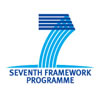|
Food is getting healthier and better, thanks to EU research
First FP7 call is expected soon
Finalisation of organic food and farming research projects
Cultural differences hamper transnational research co-operation
Food is getting healthier and better, thanks to EU research
Research results showcased in Brussels demonstrate how research is helping to make our food healthier and of better quality. New research shows that organically produced food has a higher nutritional value than conventional. Although the health benefits of fish and seafood due to omega-3 are well known, another project has discovered that there are other important health-giving components in these foods. Researchers have also been looking at improving the welfare of farm animals, not only because consumers are demanding higher standards of welfare, but also because good conditions can significantly improve the quality of our food.
First FP7 call is expected soon
 |
In the coming years, the "Seventh Research Framework Programme" (FP7) will be the main EU instrument for funding scientific research. The first FP7 call is expected to be launched in late December 2006 and in the beginning of January 2007.
CORDIS has established a separate webpage providing access to all aspects of FP7
|
Finalisation of organic food and farming research projects
Several EU sponsored research projects within organic food and faring has recently expired. Among others this is the case of SAFO (Sustaining Animal Health and Food Security in Organic Farming), EISfOM (European Information System for Organic Markets) and Organic Input Evaluation (Harmonised and Standardised procedures for evaluation of plant protection products, fertilizers and soil conditioners for use in organic agriculture).
All projects have put out their final recommendations at their websites:
Research cooperation and knowledge transfer
Cultural differences, legal differences and difficulties in finding partners are some of the main factors hampering transnational research collaboration in Europe. Transnational cooperation, which is not part of a long-term, structural alliance, is therefore relatively unattractive for both the public and the private sector due to the added complexities, which such collaboration brings with it.
This is one of the conclusions in the draft report on the online public consultation on transnational research cooperation and knowledge transfer, which has been conducted by DG Research.
|

